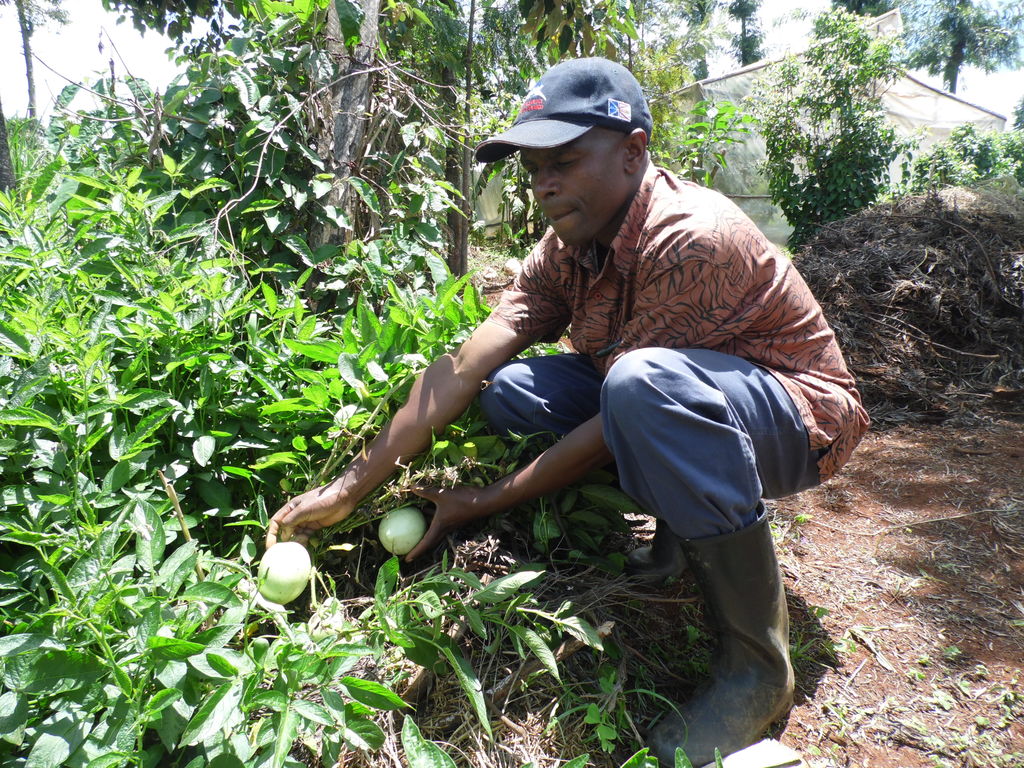
Kakamega County farmer, Wycliffe Ochango feeds his cow at the Moi AKS Showground during the 2016 tradefair. Monitoring of the dairy feeding programme is gradually increasing the milk yield for Nyandarua farmer, Peter Maina. PHOTO BY LABAN ROBERT.
Taking charge of the feeding programme of his five Friesians is gradually paying off to Peter Mwangi after consistent losses of milk despite having a superior pure breed of cows.
Children and his wife were helping him in managing the 20acre piece of land in Nyandarua County, but the cows were performing poorly even after buying the required mineral supplements and sufficient feeds.
But from 2016, when Mwangi decided to ‘troubleshoot’ the low yields, the effort is quickly increasing the milk.
“I had a fluctuation of the milk let down every time. Sometimes I lost up to three litres per cow even after calving down. But this days I can milk thrice a day immediately after calving down, reaching 30 litres per day per cow,” he said.
He milks between eight and 12 litres per day from one cow at the intervals of about six hours.
From three cows, which have varied calving down dates, he gets about 90 litres of milk while the other two are on a dry spell.
“I feed my cows a lone to ensure that I administer the right quality and quantity of feeds and mineral supplements at the right time to my cows. This I gradually boosting production because of the balanced nutrients supply. No feeding stress in the animal body system programme,” he said.
Dairy lactating cows require at least 30kg to 35kg of green and about seven kilos of green and dry fodder per day. Five to six kilos of concentrates up help the animal meet other nutritional requirements other than those in the fodder.
Protein content is one key factor that keeps milk yields high.
For Mwangi, he slices purple vetch and mixes it with Napier grass and dried maize stalks.
Whilst the vetch will give between 16 per cent and 26 per cent of proteins, Napier grass majorly offers carbohydrates even as the maize stalks play the dry fodder role.
Although he does not control the amount of water every cow must consume per day, he approximated that each of them takes about 40 litres. He believes in letting them drink to satisfaction.
READ ALSO: Farmer intercrops maize with vetch to boost milk production
READ ALSO: Fodder shrubs a cheaper alternative to commercial feeds
READ ALSO: Brachiaria grass triples Siaya farmer's milk production
In dodging the middlemen, who take advantage of most farmers, Mwangi delivers milk to the Kinangop Cooperative Society. The society pays Sh30 per litre of milk.
Mwangi always seeks the help of a health office in carrying out artificial insemination to reduce the chances of failed fertilisation.
The health officer also ensures the animals are checked and in case of anything, necessary remedies are taken.
The purple vetch is grown with other crops, where it also helps in fixing nitrogen in the soil to boost productivity.
Before slicing and mixing with other feeds, it has to be withered for three to four hours to reduce its moisture content.
Although it takes three to four month to mature, it is recommended that it should be fed after attaining at least 10 nodes.
Write comment (0 Comments)
















